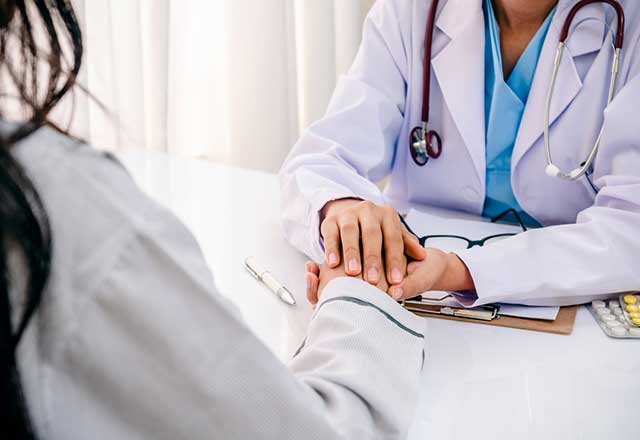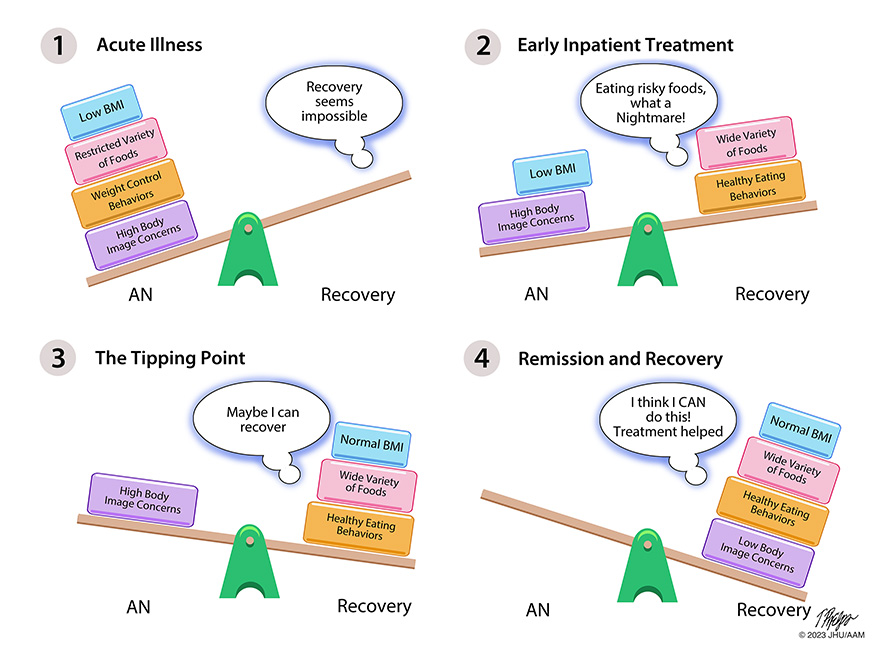Eating disorders are precipitated by a complex interplay of genetic vulnerability, sociocultural pressures, and personal experience. The Johns Hopkins Eating Disorder Program helps patients gain back control over their eating and master healthy eating. Our program provides an individualized approach that helps patients interrupt unhealthy behaviors and reach their full potential.
Thinking About Eating Disorders
Drs Angela Guarda and Graham Redgrave, Director and Assistant Director of the Johns Hopkins Eating Disorders program, answer key questions about what an eating disorders is, what can cause and sustain it, the role of body image, and how co-occurring psychiatric and medical conditions can impact treatment.
View more FAQsThe Johns Hopkins Difference
40+ Years
Nationally Recognized Program
We have treated thousands of patients with eating disorders since 1976. Our clinical practice integrates the experience of our patients with the latest research findings to maintain the best evidence-based and effective treatment.
71%
Reach BMI of 19
Our meal-based approach to anorexia nervosa emphasizes faster weight restoration, balanced eating behavior and relapse prevention skills training. 71% of our patients with anorexia nervosa reach a normal weight before leaving the program - the best known predictor of recovery.
1
Individualized Treatment
Just as no two people are exactly alike, no two eating disorders are exactly the same. We get to know you and your family and individualize your treatment to maximize your recovery.
How We Treat Eating Disorders at Johns Hopkins Medicine
At John Hopkins, treatment for eating disorders occurs in a variety of settings: inpatient, partial hospitalization, off-campus residence and outpatient clinic. Program directors explain how the team uses a behavioral approach to intervention, treatment and recovery; the role of parents in treating young people; and how to think about being ready.
Treatment OverviewPatient Information
We offer a continuum of care designed to meet every patient's needs. This includes inpatient, day hospital, outpatient, and full consultation services.
Thank you for intervening at a critical moment in my life. A year ago I believed recovery was impossible. I am truly amazed at what I have been able to accomplish with the help of your program. — Patient
What you see in your child is this behavior that is irrational - you feel both helpless and to blame. The expert care we received at Johns Hopkins empowered my two daughters to fight their eating disorder and equipped our family with the tools to understand it and to help them succeed. — Parent of Patient
Letters from Patients and Families
-
“I have recently celebrated my 10th year in recovery, and I believe that the help I received through your treatment program and staff has helped me to be the “healthy” person I am today. I realize that it was a combination of factors that led to my success at Johns Hopkins, and that perhaps, at a different facility things might have worked out differently. The program, the staff, the approach (which I view as a more behavioral/cognitive approach) were key elements, coupled with my own motivation, that helped put me on the road to recovery….I have maintained a healthy weight since my treatment at JHH, and I have been physically and emotionally healthy [enough] to give birth to a child. I have been a therapist in the past and teach Psychology. I think about my stay at Johns Hopkins often and feel fortunate that there was a program such as the one you have, to meet my needs. The fulfilling life I lead today was not an option prior to my treatment.” --- patient
-
My wife and I would like to take a moment of your time to thank you and your staff so much for helping our daughter overcome her disorder this past year. When we first arrived at your clinic we felt helpless in the face of something that we really did not understand. The professional help and care you and your staff provided our daughter gave us all the hope that things could get better… and they did!...she is doing very well, has a great attitude and is determined never to go back to where she was. We all feel blessed to have found the resource in your program at Johns Hopkins to help us overcome our daughter’s disorder and wanted to tell you again how much we appreciate all you’ve done in giving us our daughter back. – parent of patient.
-
“I was a patient on the Eating Disorders Unit at Hopkins four times…Several years ago I ran into another patient I knew from the floor and she said she was surprised I am alive… Every day I am grateful. I know others don’t make it, or that they continue to struggle with their eating disorders for the rest of their lives. I am one of the lucky ones who got better. I no longer worry about food or weight. I’m happy and healthy. I owe a lot of this to the hard work and dedication of the staff at Hopkins who didn’t give up on me, encouraged and taught me, despite the fact that I returned multiple times. I eventually came to believe what you all were telling me – that if I dieted I would die.” -- patient
-
“I just want to take the time to thank you for SAVING MY LIFE. Before I came to your program I was in a real mess. I was in several different programs that really did not help me…I can now say that I really have my life back. Hopkins gave me the tools to work through everyday situations and showed me the light when I was in darkness. Today I eat 3 meals a day and eat foods that I thought I would never eat.” – patient
-
“If you are about to enter treatment for an eating disorder you might feel scared, angry, sad…any variety of emotions. They are pretty normal. I speak from experience…it’s going to be OK. This is a chapter in your life which will not last forever. But no matter the outcome, it’ll change your life. It’s been 15 years since my last stay at Johns Hopkins or any other treatment for my eating disorder or depression. When I first came to Hopkins I was a mess and far from motivated to be helped... Despite my best efforts to push away any help that was offered to me, the team did not give up on me. .. I won’t say it [recovery] was an easy road because it wasn’t. There were many slips along the way. But as time went on there were more good days than bad days… As you begin your stay at Johns Hopkins, remember that recovery is possible. That you can get through this season in your life and that there are people who care about you and want to see you succeed. – patient
-
“Hopkins saved my life…it is safe to say that I would most likely not be here if I did not receive the tremendous care of this program. As a strong-willed young man, it was nearly impossible for anyone, including myself, to control my disease and although I firmly resisted treatment, I am extremely grateful for the intervention I received at Hopkins…. This disease is a fight, but the program gives you the necessary skills and support to regain control of your life and be healthy. I now live a normal, happy and productive life.” – patient
-
“Our son struggled with restrictive eating throughout adolescence. The illness progressed steadily despite ongoing private counseling, medications, and repeated parental interventions. We chose Johns Hopkins after much research when it was clear that the disease was in full control, and the very life of our son was at risk… As an inpatient he tried desperately to convince us that the program was killing him, not the anorexia…now he has regained control of his life and is thriving and he continues to receive periodic outpatient treatment at Hopkins by his own choosing. The program provides the structure and support necessary to separate the patient from the disease and to slowly empower patients to regain control of their lives. Family members are encouraged to participate and to work with providers and their loved ones as a team. I believe this is an important part of treatment and recovery.” ---father of patient.
Contact Us
Johns Hopkins Eating Disorders Program
Johns Hopkins Eating Disorders Program
Department of Psychiatry and Behavioral Science
The Johns Hopkins Hospital
600 North Wolfe Street, Meyer 101
Baltimore, Maryland 21287
Patients and visitors, please use the Wolfe Street entrance at the end of the traffic circle.
Directions
Inpatient and Day Hospital (Partial Hospitalization) Information
Phone: 410-955-5114
Fax: 410-955-6155
Email: [email protected]
Eating Disorders Intake Referral Form
Outpatient and Consultation Services
Phone: 410-955-3863
Fax: 410-502-7907
Email: [email protected]
Referring Physicians
For referring physicians, please contact Dr. Guarda [email protected], Dr. Redgrave [email protected], or call the Hopkins Access Line at 800-765-JHHS.







